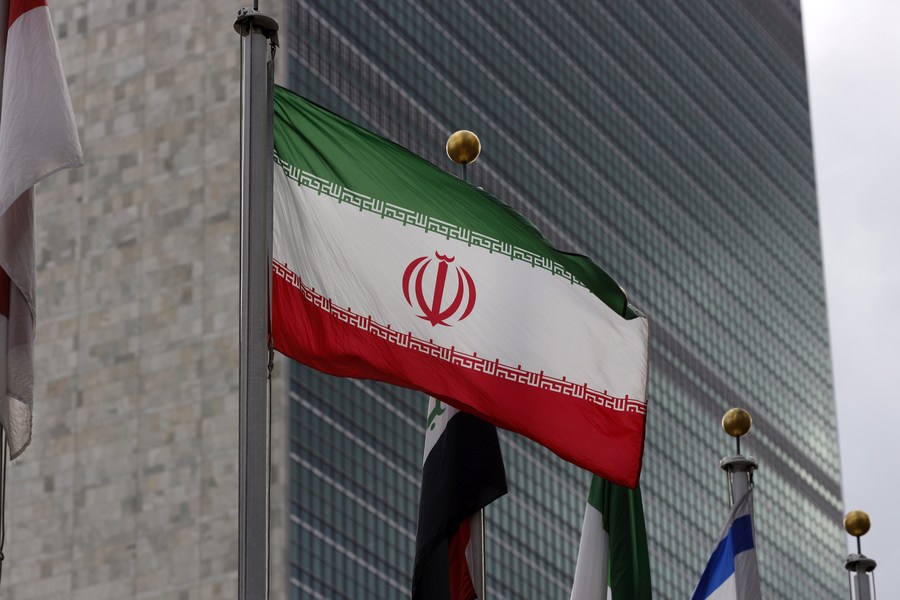
An Iranian flag is pictured at the United Nations headquarters in New York, Jan. 8, 2020. (Xinhua/Li Muzi)
"So we are living in a situation of no snapback, of the full implementation of Resolution 2231. I understand that the U.S. themselves understand it, and they simply use that situation in order to go with their own unilateral sanctions on Iran, to continue their policy of maximum pressure on that country," Vassily Nebenzia said.
UNITED NATIONS, Oct. 1 (Xinhua) -- The "snapback" mechanism on sanctions against Iran has not been invoked, contrary to a U.S. claim, said Vassily Nebenzia, the Russian ambassador to the United Nations, in his capacity as president of the Security Council for the month of October.
"On the snapback, I think everything is clear. The snapback has not happened," Nebenzia told reporters on Thursday.
The Security Council spoke about it unequivocally. Nearly all council members sent letters to the president of the Security Council in August, stating their position that they did not share the view of the United States and that they believed Security Council Resolution 2231, which endorsed the Iran nuclear deal, stays intact, he noted.
The council members' position was confirmed in the presidential resume of the discussion at the end of August during the Indonesian presidency of the Security Council, and later confirmed by the Nigerien presidency, said Nebenzia.
After the so-called snapback grace period -- the 30 days -- expired on Sept. 19, the United States announced that the snapback now is in force, he noted.

A woman walks past the United Nations headquarters in New York, the United States, Sept. 14, 2020. (Xinhua/Wang Ying)
The same countries reaffirmed their position, sending letters to the Security Council president and the UN secretary-general, saying that in their view, the snapback is wishful thinking of the United States, said Nebenzia.
"So we are living in a situation of no snapback, of the full implementation of Resolution 2231. I understand that the U.S. themselves understand it, and they simply use that situation in order to go with their own unilateral sanctions on Iran, to continue their policy of maximum pressure on that country," he said.
Resolution 2231 provides for the snapback mechanism, which can only be invoked by a participant of the Iran nuclear deal.
The United States, which was originally a participant along with Britain, China, France, Germany, and Russia, lost its status after its withdrawal from the deal in May 2018.
Under Resolution 2231, any participant state to the Iran nuclear deal can notify the Security Council about an issue that it considers a significant violation of the agreement. The UN sanctions in place before the adoption of Resolution 2231 in July 2015, including an arms embargo, would resume 30 days after the notification, unless the Security Council adopts a resolution to decide otherwise.
Under Resolution 2231, the arms embargo against Iran expires on Oct. 18, 2020. ■



